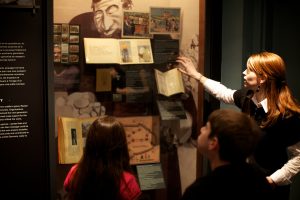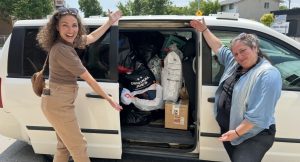Hate and division are spreading like wildfire, and the global resurgence of antisemitism is a wake-up call we can’t afford to ignore.
This isn’t just a Jewish issue; it’s a fundamental human crisis that demands our immediate attention.
Our diverse backgrounds—Black, Muslim, and Hongkongese—offer unique perspectives on this pressing issue. We’ve seen firsthand how antisemitism corrodes the foundations of our academic communities, threatening the values of inclusivity and respect that should be at the heart of higher education.
***
Raihaana Adira, an Islamic Studies and International Development student at McGill University
I experienced a profound shift in perspective during my visit to Israel. The reality I encountered stood in stark contrast to the narrative I’d absorbed on campus. Instead of the “genocidal apartheid state” I’d heard about, I discovered a vibrant, loving society striving for peace and co-existence.
My interactions with Israelis, who shared their stories of resilience and hope, shattered the propaganda I’d previously encountered. I saw families working hard to build a future, communities coming together across religious and ethnic lines, and a complex society grappling with challenges much like any other.
However, upon returning to McGill, my newfound empathy was met with severe backlash. I was labeled a “Zio-Nazi” and accused of supporting genocide. The ignorance and hate I encountered showed just how urgent it is to fight antisemitism on our campuses. It became clear that advocating for understanding and nuance when it comes to Jews and Israel is met with hostility and rejection.
***
Jean-Luc Mudingayi, a Political Science and Haskayne School of Business student at the University of Calgary
I’ve dedicated the past two years to showcasing Israel and connecting Jewish and non-Jewish communities. As a board member of Students Supporting Israel, I’ve seen the power of dialogue and cultural exchange in breaking down barriers.
My visit to Israel as a Common Ground Ambassador for Allied Voices for Israel (AVI) was transformative. I immersed myself in Jewish culture through Shabbat dinners, wearing a kippah, and enjoying traditional foods like shakshuka. These experiences elevated my appreciation for the rich heritage and resilience of the Jewish people, highlighting the importance of firsthand encounters in fostering understanding.
The Oct. 7 attacks by Hamas and Palestinian Islamic Jihad brought a new urgency to our work. The disruptions at hostage vigils were deeply troubling, revealing a lack of empathy and a willingness to justify violence against civilians. Yet, the Jewish community’s resilience in the face of such hate has been inspiring. Their strength reinforces the importance of allyship—we must stand in solidarity to ensure they do not face these challenges alone.
***
Justin Chow, a recent graduate of the University of Toronto
As a Hongkongese international student, I’ve realized that the fight against antisemitism is not just a Jewish issue but a human one. Witnessing the escalating hostility and proliferation of antisemitic rhetoric on a systemic level at UofT has only galvanized my commitment to advocacy.
Since Oct. 7, I’ve faced verbal assault, intimidation, and discrimination both online and in-person due to my support for the Jewish community and my commitment to peace. I’ve seen our universities fail to protect the physical, emotional, and academic safety of their students, allowing hateful, anti-Jewish encampments to proliferate on our campuses.
The normalization of antisemitism in academic settings is particularly insidious. Dog whistles, tropes, and unfounded accusations against Israel masquerade as intellectual discourse and logically sound debate. This poisoning of academic dialogue not only marginalizes Jewish students but also degrades the quality of education for all.
As people who have no involvement with Israel or the Jewish community, it’s easy to turn a blind eye and pretend as if everything’s okay. But we implore you: if you’re not Jewish, try to see what is happening on our campuses as if you were Jewish. Imagine the fear and isolation. If you’re not Israeli, think about what happened on October 7 as if you were Israeli and your family lived in Israel. Feel the terror and anguish. This isn’t just someone else’s problem—it’s our collective moral imperative.
***
We call on all non-Jewish students, faculty, and community members to take action:
- Reach out to a Jewish friend—if you don’t have one, make one. Engage with your local Jewish community, offer your support, and listen to their experiences.
- Be an advocate online and in person. Challenge antisemitic rhetoric, dispel media biases that entrench division, and speak up when you witness discrimination.
- Urge your university administration to adopt clear policies against antisemitism and to protect Jewish students’ rights to express their identity and beliefs.
Now is the time for allies to speak up, educate ourselves through empathy, and eradicate antisemitism. What begins with the Jews never ends with the Jews. Our silence is complicity; our action affirms our shared humanity. Let’s not wait for history’s judgment—let’s make history ourselves.
Raihaana, Jean-Luc and Justin are student ambassadors with Allied Voices for Israel.







